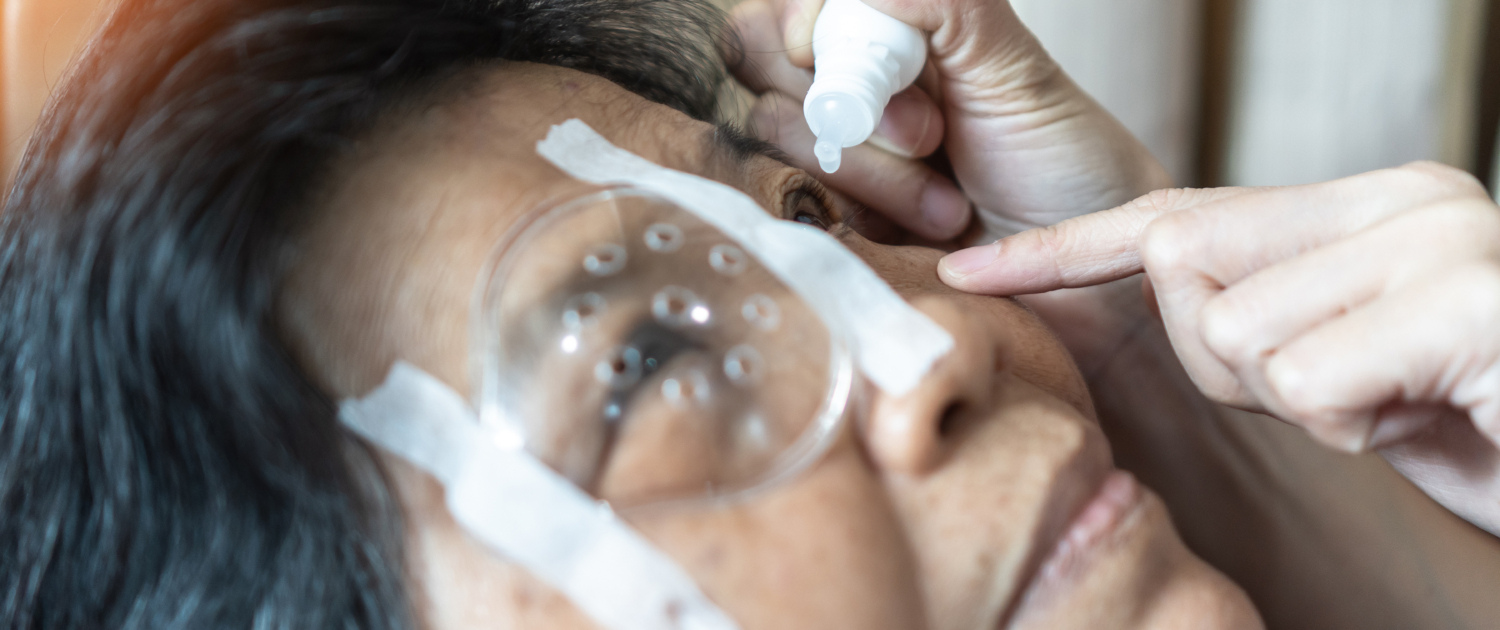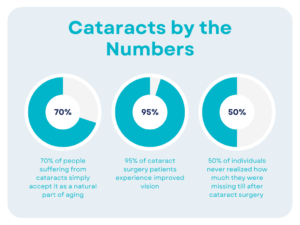Training Eyes After Cataract Surgery

Have you recently undergone cataract surgery or are you currently considering it? Our eye doctors can provide guidance that will help your eyes heal faster. Recovery can take up to two months, depending on how well you follow postoperative instructions and your circumstances. One of the easiest ways to overcome your vision imbalance is to train your eyes to perform daily tasks.
Rest assured that cataract surgery is safe and has a high rate of success, especially when you come to a reputed eye care center such as Visionary Eye Doctors. However, the work done after surgery is essential to the healing process. You can expedite your recovery by retraining your eyes. Our cataract surgeons have put together essential information, including exercises to adjust your eyes to the new lens implants.
 Cataract Surgery Overview
Cataract Surgery Overview
Your natural eye lens is removed and replaced with an artificial one during cataract surgery, a laser vision correction procedure. There are several lenses to choose from, and your eye doctor will help you understand which ones will work best for your vision goals.
The outpatient surgery takes about 15 to 20 minutes per eye, and you can go home after a few hours. Our staff will monitor your progress following the procedure, answer any questions you may have, and provide careful instructions on post-operative care.
Lenses Used to Restore Vision After Cataract Removal
Different types of lenses can be used to replace your natural lens, depending on your vision needs and preferences. Choose the right intraocular lens (IOL) based on your needs, as follows:
- Monofocal lenses: These lenses provide clear vision at one distance only, usually far away. You may still need glasses to read or work on a computer.
- Multifocal lenses: For clear vision at multiple distances, such as near, far, and intermediate, choose multifocal lenses. They can reduce or eliminate your need for glasses, but you may also experience glare or halos around lights when driving or walking at night.
- Toric lenses: Do you have astigmatism, a condition where an irregularly shaped cornea causes blurred or distorted vision? Toric lenses correct astigmatism, providing clear sight at one focal point (near or distant vision).
- Accommodative lenses: This type of artificial lens shifts to mimic your eye’s ability to change focus for near or far objects, providing clear vision at multiple distances.
- Light-Adjusted Lenses: Light-adjusted lenses are used in cataract surgery to enhance vision by adapting to varying light conditions, providing patients with improved visual clarity and quality.
Work with your vision expert to determine which intraocular lens is right for you.
What Is Neuroadaptation and How Can It Complicate Recovery?
Neural adaptation refers to the way your brain adjusts after you receive a new lens implant during a surgical procedure. Essentially, you have to relearn to use your eyes effectively following cataract surgery. This can take some time, so you’ll need a little patience. Remember that our team is always a phone call away and ready to assist you, especially if you have questions or concerns regarding accommodative or multifocal lenses.
You may experience the following symptoms as your eyes and brain adapt to your new lenses:
- Glare
- Halos
- Ghosting
Give your eyes time to adjust to new clarity and visual acuity. To expedite the process, use your eyes for different activities that you would normally perform. We ask that you refrain from switching too often between wearing glasses and taking them off. This can disrupt the adaptation and interfere with your vision.
Cataract eye surgery has one of the highest success rates of any surgery according to previous studies. The Cleveland Clinic reports that over 97% of cataract patients in the United States are happy with the outcome of their laser-assisted cataract surgery. You may notice an improvement in a few days or less. Over the following weeks, you’ll probably reduce your dependence on glasses or contact lenses. Additionally, many patients report an improved quality of life due to the improvements in their eyesight.
Ways to Retrain Your Eyes
Whether you achieve great results partially depends on taking proper postoperative precautions. Perform the exercises below to experience the best results and enjoy a positive visual outcome. Using your environment for training helps you get back into your daily activities (without glasses or contacts!) faster.
Don’t physically disrupt healing
Following cataract surgery, your eyes will be susceptible to germs and easily irritated by dirt and debris. Therefore, it’s important to avoid wearing makeup, playing sports, or rubbing your eyes. Applying makeup can introduce bacteria that can cause an infection. When you rub your eyes, you can dislodge the lens or damage the incision point.
While you should avoid any activities that expose your eyes to injury or trauma, swimming, contact sports, and gardening are strictly off-limits in the month following your surgery. So, save any strenuous exercise for after the recovery period.
Shift your gaze from near to far objects
Shifting your gaze from near to far objects gives your lens and brain a workout. Why is that important? Remember what you learned about neuroadaptation. The more your eyes and brain do something, the easier it becomes. Your brain gets used to the sharper images sent by your new lenses, making it easier for you to focus and see clearly. So, practice until it’s perfect!
Find a comfortable spot in front of a window or on a balcony. Pick a nearby object, such as a book or plant, and stare at it for a few minutes. Now, choose a distant tree, house, or other object and focus on it for a few minutes. Repeat this pattern a few times to train your brain on how your new lenses work.
Exercise your near vision
Start slowly with the following activities before working your way up to spreadsheets and complex images.
- Choose an activity, such as:
- Playing cards
- Reading
- Working on a crossword puzzle
- Reading your emails
- Remember to rest your eyes every 20 minutes to prevent eye strain. This exercise helps you enjoy activities that were difficult to do with glasses or contact lenses before surgery.
Exercise your far vision
Going for a walk in your neighborhood and focusing on far away objects is a great way to exercise and give your eyes a workout too. You can also focus on far away landscapes by tracing the horizon with your eyes.
Driving is an excellent way to train your eyes and your brain following cataract surgery. Make sure that you only do so with the approval of your eye doctor. You’ll feel more confident driving if you practice walking around the neighborhood and focusing on distant objects during the day and night.
For an extra challenge, change the direction of your vision and the distance of the objects you focus on. Remember to rest your eyes often.
Computer games
Are you ready for more challenging recovery exercises? Try online games created for cataract recovery training to have some fun and give those new eyes a workout.
The benefits of playing these games include:
- Better visual acuity (goodbye blurry vision!)
- Increased contrast sensitivity
- Improved depth perception
- Clearer night vision
Galaxy Vision Training: This game simulates the night sky, and you practice finding stars and constellations. There are several difficulty levels to keep you engaged. So, learn more about the stars as you strengthen your sight.
RevitalVision: Using visual stimuli and tasks, this game trains your brain to achieve a higher level of visual acuity.
The Need for These Trainings Post Cataract Surgery
Now that you know some of the ways that you can retrain your eyes, it will be easier to work through the exercises on your own. Remember that performing these activities can help you speed up the recovery process. You already did the hard work by getting the surgery. However, it’s important to complete these final steps to gain the best results possible.
If you have any questions or concerns or feel uncomfortable performing any of these activities, stop immediately. Consult with your eye surgeon before continuing these exercises if you experience discomfort or pain. Your eye doctor may give you different exercises to practice based on your medical history and current eye condition.
How We Help, Even Post Surgery
Visionary Eye Doctors is there for you every step of the way, from pre-surgery consultations through the cataract surgery itself and during the postoperative phase. Our specialists in cataract surgery deliver best-in-class service when it comes to creating a warm, supportive environment and looking out for your health and well-being.
Follow your doctor’s instructions regarding when to resume normal activities. You’ll receive a prescription for eye drops and medications to prevent infection. Our team will also help you understand what to avoid during recovery. At each follow-up appointment, we can quickly evaluate any surgical complications that may arise. Be sure to take advantage of our other services and products, such as glasses or contact lenses, if you still need them.
At Visionary Eye Doctors, we are committed to helping you achieve the best possible vision after cataract refractive surgery. Partner with us to improve your vision with the right care and treatment options.
Contact us today to schedule a consultation or learn about our caring eye doctors, who’ll be there for you during cataract surgery and post-surgery care.
